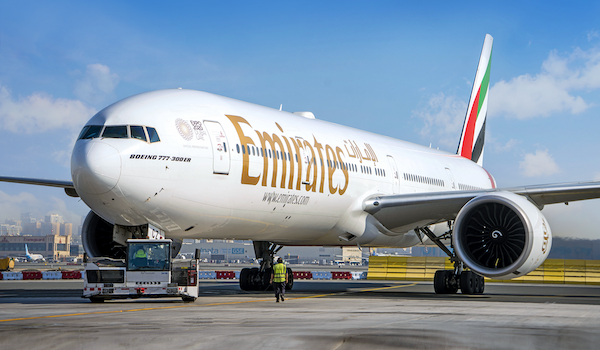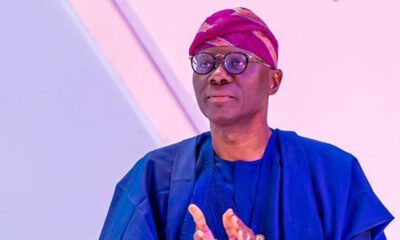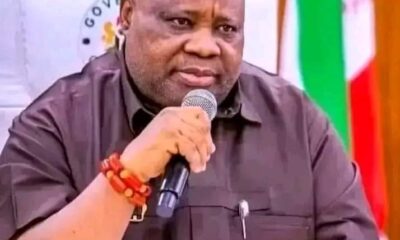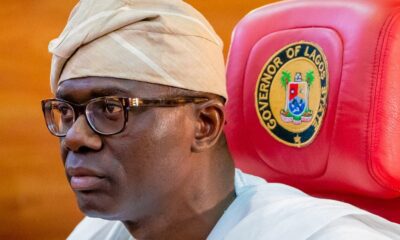Top Story
Lagos ready for you — Sanwo-Olu to prospective investors
Lagos State Governor Babajide Sanwo-Olu played the quintessential salesman on Monday, reeling off his administration’s achievements in the past three years to woo investors to the state.
Mr Sanwo-Olu met a group of would-be investors in New York on the sidelines of the 77th session of the United Nations General Assembly at a roundtable organised by the Business Council for International Understanding (BCIU) at Park Lane Hotel in the heart of the city. He got an exciting response from the group of corporate giants who urged him to see himself as an ambassador of the private sector to the Federal Government.
With confidence, the Governor spoke of the major strides Lagos State has made in the past three years, despite COVID-19. He used the THEMES Agenda – the six-pillar development plan of his administration — as a guide.
According to the Governor, the state’s GDP has gone up by $5b to about $145,141b, budget has doubled to about N1.7tr and infrastructural development has been tremendous. He cited landmark developments in transportation, the first pillar of THEMES, saying the Red Line and Blue Line rail projects were on track to be commissioned by the end of the year. The rolling stocks for the Red Line, which his administration started, he said, are on the way to Lagos and work is going on as scheduled on the stations and the overpasses that will ensure a good transportation experience. There are about four other lines to be built for the state to be covered by rail so as to ease the pressure on roads.
Mr Sanwo-Olu minced no words on the purpose of the meeting — to attract more investors to Lagos, which has 80 per cent of Foreign Direct Investments coming into Nigeria. He spoke of opportunities in water transportation, saying from seven ferries, the state’s fleet has risen to 21, besides many others run by private operators. Investors can double the fleet, Sanwo-Olu said.
Many of the 15 jetties being built by the state are ready for commissioning, he added, stressing that the aim is to have an integrated urban transportation system, strengthened by a strategic road infrastructure, such as the Lekki-Epe Expressway and the Fourth Mainland Bridge, which has attracted many investors, among which one will be chosen before the end of the year.
The state, said the Governor, plans to build an Infectious Diseases Research Centre to tackle health challenges, such as COVID-19.
Over 1,000 school projects have been completed and “we have introduced technology to make teaching and learning an exciting experience.”
“We are seeing the results. We used to have about 36 per cent pass in School Certificate Examinations; now we have about 80 per cent,” Sanwo-Olu said.
“We are opening brand new schools and introducing technology by giving teachers tablets to aid their job.”
He spoke about the 6,000 km fibre optic cable being laid around the state, saying the first phase of 3,000 km was almost completed. This, he said, will aid faster and cheaper internet connectivity, thereby boosting service in hospitals and schools, besides boosting the impressive activities of the youth in the tech ecosystem.
Mr Sanwo-Olu described Lagos as the “entertainment capital of Africa.” He cited the recent Headies Awards in Atlanta and added that a Film Village was on the way. He mentioned opportunities in housing and assured would-be investors of “the sanctity of contracts,” with the state appointing new judges to aid smooth operations of the Judiciary.
On security, Mr Sanwo-Olu described Lagos as “the safest state in Nigeria.” He said small businesses were being supported with grants, even as the youth and women are being encouraged.
It was, however, not all a matter of pass marks. The Governor spoke of challenges, such as refuse disposal, saying about 4,000 metric tons were being generated daily. This, in his view, should attract investors, who are willing to turn waste to wealth – a path the state is willing to tread. There are also challenges in water, power and other sectors, which are awaiting investors, Mr Sanwo-Olu said.
The applause was loud as Mr Sanwo-Olu ended his speech. Replying, the Managing Director (Africa) of McLARTY Associates, Amb. (ret.) Terence P. McCulley, praised Mr Sanwo-Olu for an insightful account of his administration’s policies and projects.
He said many “people who have returned from Lagos have spoken of how they no longer recognise the state because of the developments taking place there.”
He is of the view that the Governor has done well “because good governance is about providing services.”
Amb. McCulley said, “You can be the ambassador of the private sector to the Federal Government, providing an enabling environment for manufacturing, agriculture and technology, which are drivers of diversification.”
A participant spoke about the discovery of talents among Nigerian youths in the tech space. He said such talents were being lost to other countries because they could not be retained in Nigeria. Mr Sanwo-Olu said the government was doing so much to link young graduates to companies which train them to make them employable under its Graduate Internship Programme, which has absorbed thousands of youths. There are other programmes, he said, agreeing that a retention strategy for talents was necessary.
At the meeting were Stephen Jennings, founder and CEO of Rendeavour, the organisers, Country Head, Nigeria, Rendeavour, Eyong Ebai, CEO, Africa, GE Healthcare, Mr Patrick Santillo, Senior Vice President, BCIU, Mr Biodun Dabiri, Chairman, Lekki Worldwide Investment and many others.
With the Governor were Economic Planning and Budget Commissioner, Sam Egube; Energy and Mineral Resources Commissioner, Lere Odusote, Information; Strategy Commissioner, Gbenga Omotoso, Special Adviser on SDG and Investments, Mrs Solape Hammon; Special Adviser on Public Private Partnership Ope George and Permanent Secretary, Ministry of Science and Technology, Mrs Ibilola Kasumu.
Top Story
Account enrollment: Court validates CBN’s regulation, permits collection of customers’ social media handles


…Dismisses concerns, says social media handles not protected by privacy rights
…Financial institutions cleared to collect social media handles for KYC
By Sodiq Adelakun
The Federal High Court in Lagos has ruled in favour of the Central Bank of Nigeria (CBN) in a case challenging the regulation that requires financial institutions to collect their customers’ social media handles as part of the Know-Your-Customer (KYC) procedure.
Recall that the Socio-Economic Rights and Accountability Project (SERAP) had urged the court to compel CBN to withdraw its directive to banks and other financial institutions.
However, in the ruling, Justice Nnamdi Dimgba struck out the suit filed by Lagos-based lawyer, Chris Eke, who argued that the regulation violates the right to privacy of bank customers.
Eke had sought a declaration that the regulation contained in Section 6(a) (iv) of the Central Bank of Nigeria (Customer Due Diligence) Regulations, 2023, is undemocratic, unconstitutional, null, and void, as it contradicts Section 37 of the 1999 Constitution of the Federal Republic of Nigeria (as amended). However, Justice Dimgba ruled that the regulation does not breach the right to privacy of bank customers.
The CBN regulation is targeted to enhance customer due diligence and anti-money laundering measures, and requires banks to collect social media handles, among other personal information, from their customers.
The applicant had asked the court to grant an order of perpetual injunction, restraining CB from enforcing the regulation which requires financial institutions to request customers’ social media handles as part of normal bank customer due diligence requirements.
The CBN in its response to the suit, filed a notice of preliminary objection, challenging the competence of the suit. The apex bank also disagreed that the said regulation constitutes any interference with the private life of the applicant, as claimed.
The judgment came as Justice Dimgba dismissed a suit, stating that the notice of preliminary objection held merit and consequently struck out the case.
During the proceedings, Justice Dimgba emphasised that providing a social media handle is akin to furnishing email addresses, phone numbers, and other contact details for banking purposes.
He argued that such information aids in conducting due diligence to ascertain if an individual is suitable for conducting business with a bank.
Justice Dimgba further explained that the essence of having a social media account implies a willingness to engage in public communication, thus rendering privacy concerns unfounded.
According to him, “First, the Applicant claims that the requirements on the CBN Regulations for financial institutions to request and collect the social media handle of its customers as part of KYC infringes on his right to privacy.”
“This claim is very ambitious and amounts to a very far throw. The said Regulations are directed to and apply to financial institutions. It does not apply to private individuals such as the Applicant.
“Even if, as appears to be argued, that the Regulations itself would inevitably affect the Applicant, this claim is speculative for the simple reason that in nowhere in the affidavit in support was it stated that the Applicant operates an account with a financial institution and that the said institution had demanded his social media handle. So the suggestion that he would be affected by this Regulation, albeit negatively, is very speculative and at large.
“Secondly, there is also no deposition to the effect that any financial institution had begun to implement this Regulation and that its implementation had begun to create disruptions and inconvenience against the general population, in which case one could infer that the suit should be legitimated as a public interest litigation.
“Thirdly, assuming even that the banks had begun to implement these regulations, the applicant assuming he maintained any bank accounts or sought to open one, but is being hindered or irritated by the requirement of the Regulation to avail his social media handle as part of KYC, the Applicant still had a choice, which is to refuse to do business with any bank insisting on the information as part of its social media handle, but to seek other alternatives.
“Fourthly, and for all it is worth, I do not see how asking a banking or potential banking customer to provide his social media handle can ever amount to a breach of privacy.
“Granted that Section 37 of the Constitution of the Federal Republic of Nigeria 1999 (as amended) provides inter alia: The privacy of citizens, their homes, correspondence, telephone conversations and telegraphic communications is hereby guaranteed and protected.
“My view is that the provision of a social media handle is of the same genre as the provision of email address, phone numbers and other means by which a potential customer of a bank can be contacted.
“Thus, it is clear from the face of the Regulations as set out above that email addresses, phone numbers and social media handles are all provided for under clause 6iv just to show that the aim was not to pry on anyone but rather to provide alternative ways by which a customer of the bank can be contacted, and or due diligence conducted on the person to determine if the person is a fit and proper person to extend banking services to.
“I do not see how this infringes on the right to privacy. I should even say that the essence of having a social media account was for one to be publicly visible communication-wise. It, therefore, appears quite ironic, though wryly, that one can suggest that asking for information about a social media handle with which the individual exposes and immerses himself or herself in the public, can amount to a violation of privacy rights, which rights itself is all about isolation of one from public glare.
“It is also to my knowledge that even in filling some business applications, personal information of this sort, is sometimes requested, and parties generally oblige. If it does not constitute a breach of privacy, why should it now?
“A social media handle is left at large for the world to see, being in the public space, everyone enjoys the liberty to have access to it whether or not consent was obtained. It would be highly unreasonable to hold the Respondent in breach of privacy for what other persons have access to.
“The apprehension of the Applicant of his social interactions being monitored is manifestly speculative in itself and rather incredulous to believe that the financial institutions have the luxury of time to concern itself with such frivolities.
“On the whole, if I did not sustain the NPO, I would have dismissed the suit for the reasons stated. But the NPO having been sustained, the suit is therefore hereby struck out.”
Top Story
N1.3trn power debt: Tinubu approves payment, unveils plan to liquidate gas debts


President Bola Ahmed Tinubu has given approval for the payment of N1.3trn legacy debts owed power generation companies.
Minister of Power, Chief Adebayo Adelabu speaking at the 8th Africa Energy Market Place 2024 in Abuja said that President Bola Tinubu has approved a plan to liquidate the debts.
According to him, “Mr. President has approved the submission made by the Minister of State Petroleum (Gas) to defray the outstanding debts owed to the gas supply companies to power generation companies. The payments are in two parts, the legacy debts and the current debts. For the current debt, approval has been given to pay about N130 billion from the gas stabilisation fund which the Federal Ministry of Finance will pay.”
“The payment of the legacy debt will be made from future royalties in exchange for incomes in the gas subsector which is quite satisfactory to the gas suppliers. This will allow the companies to enter into firm contracts with power generation companies.
“For the power generation companies, the debt is about N1.3 trillion and I can also tell you that we have the consent of the President to pay, on the condition that the actual figures are reconciled between the government and the companies. This we have successfully done and it is being signed off by both parties now. Majority has signed off and we are engaging to ensure that we have 100 percent sign off.
“The debt will be paid in two ways, immediate cash injection and through a guaranteed debt instrument, preferably a promissory note. This assures the companies that in the next three to five years, the government is ready to defray these debts.”
The Minister further stated that the government was working to get the distribution companies solvent and effective by unbundling their operations along state boundaries.
He insisted that the areas covered by the current DisCos were too large for them to deliver effective services to consumers.
In the same vein, the Chairman of the Nigerian Electricity Regulatory Commission (NERC), Engr. Sanusi Garba lamented the poor financial state of the DisCos, noting that it is difficult for them to raise the needed capital to invest.
Engr. Garba pointed out that the challenges facing the sector were a culmination of all past inactions and missteps by those saddled with the responsibilities of managing the sector both at policy and operational levels.
According to him, “Today when you look at distribution companies they are clearly and technically insolvent, and you also want them to raise capital in terms of debt or equity. It’s a Herculean task. I also want to mention that implementing the power sector reform requires very strong political will to implement decisions that impact on the wider public.”
However, the African Development Bank (AfDB) disclosed that it has so far spent over $450 million to support various power sector projects and programmes with another $1 billion planned to support the power sector reform effort by the government.
Top Story
Emirates Airline to resume Lagos-Dubai flights October 1


Emirates Airline has disclosed that it will resume services to Nigeria from October 1, 2024, operating a daily service between Lagos and Dubai.
This development was announced in a statement on Thursday by the airline, which has its hub in the United Arab Emirates (UAE).
The airline disclosed that flight services will be operated using a Boeing 777-300ER.
“We are excited to resume our services to Nigeria. The Lagos-Dubai service has traditionally been popular with customers in Nigeria and we hope to reconnect leisure and business travellers to Dubai and onwards to our network of over 140 destinations.
“We thank the Nigerian government for their partnership and support in re-establishing this route and we look forward to welcoming passengers back onboard,” Emirates’ Deputy President and Chief Commercial Officer, Adnan Kazim, said.
Recall that Emirates Airlines had suspended its Dubai-Lagos flights in 2022 over its inability to repatriate trapped funds in Nigeria in the heat of the diplomatic row between the two countries.
This comes after Festus Keyamo, Minister Of Aviation And Aerospace Development in a post on his X (formerly Twitter) page had disclosed that he got correspondence from Emirates Airline when he visited Salem Saeed Al-Shamsi, ambassador of the United Arab Emirates (UAE) in Abuja.
”Yesterday, I paid a working visit to the Ambassador of the UAE to Nigeria, His Excellency, Salem Saeed Al-Shamsi at the UAE Embassy in Abuja. He handed me a correspondence from the Emirates Airline indicating a definite date for their resumption of flights to Nigeria,” Keyamo said.
-
Finance4 months ago
Court orders Sen. Victor Umeh to repay N136m bank debt to AMCON
-



 Abuja Update3 months ago
Abuja Update3 months agoUNDP, FG partnership needed to achieve inclusion, equity- Minister
-
Abuja Update2 months ago
Banks drive stock market performance with N147bn gain
-
capital market2 years ago
Rt.briscoe, FBNH, Others halts negative performance of stock market
-
Submission Guidelines4 months ago
CALL FOR SUBMISSIONS: POETRY COLUMN-NND
-



 Health1 month ago
Health1 month agoCapacity training will reduce migration of health workers- NPHCDA
-



 Business4 weeks ago
Business4 weeks agoTingo Group unveils Tingo Electric, Tingo Cola drink at Lagos launch
-
News4 months ago
Oil thieves sponsoring malicious media campaign against Navy – Spokesman














